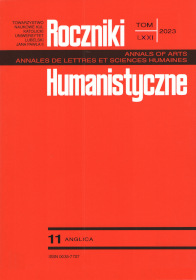The Timescape of an Artificial Friend: Posthumous Life in Kazuo Ishiguro’s Klara and the Sun
The Timescape of an Artificial Friend: Posthumous Life in Kazuo Ishiguro’s Klara and the Sun
Author(s): Maxim ShadurskiSubject(s): Language and Literature Studies, Studies of Literature, British Literature
Published by: Towarzystwo Naukowe KUL & Katolicki Uniwersytet Lubelski Jana Pawła II
Keywords: timescape; narrative; android; human; posthuman; Anthropocene; Kazuo Ishiguro
Summary/Abstract: This article examines Kazuo Ishiguro’s Klara and the Sun (2021) through the notion of timescape, which builds on Barbara Adam’s interventions into the sociology of time. Timescape receives its further conceptualization at the intersections between critical posthumanism, narrative theory, and Anthropocene discourse. In application to Ishiguro’s novel, it opens up the protagonist narrator’s multifaceted relationship to time. Klara is a solar-powered android who at once embodies and attempts to rectify the human impacts on the planet. Timescape allows me to explore Klara’s nonhuman temporalities in three analytical moves. First, through timescape, I contextualize Klara alongside the geological registers of the Anthropocene and theorize her ontological and chronological position as regards the human and the posthuman. Second, timescape brings out Klara’s self-aware preoccupations with the linear order of her narrative, on the one hand, and the temporal disjunctures of that narrative, on the other. And third, Klara’s timescape supplies insight into both her examined prosthetic life and an afterlife of unexamined possibilities. I argue that Klara envisages her algorithmically inflected posthumous life in stark separation from her human forebears.
Journal: Roczniki Humanistyczne
- Issue Year: 71/2023
- Issue No: 11
- Page Range: 63-73
- Page Count: 11
- Language: English

